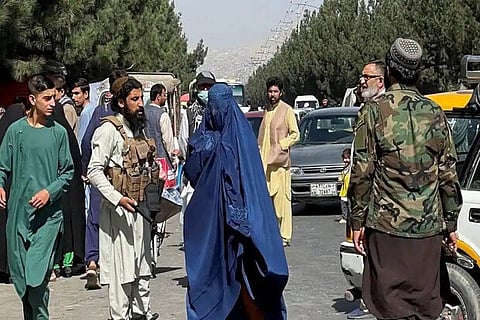

Kabul
Afghanistan now is experiencing a collapse of administration and economy, rising food prices, restrictions on basic freedom, and brutalities against women and children. And there is no mechanism to seek redress or appeal, thus creating a hell-like situation for Afghan people.
The humanitarian organizations and non-profits working in Afghanistan have painted a horrific picture of Afghanistan and its people.
United Nations Secretary-General Antonio Guterres said a humanitarian catastrophe loomed in Afghanistan. "Almost half of the population need humanitarian assistance. One in three don't know where their next meal will come from. Now more than ever, Afghan children, women & men need the support & solidarity of the international community," he said.
With the withdrawal of the US troops, the economy of Afghanistan has taken a blow as the foreign fund assistance to the country has started receding. The World Bank and the International Monetary Fund (IMF) have cut off their finance to the war-torn country as the international community debates over whether to recognize the Taliban government.
IMF has halted Afghanistan's access to its resources including the country's share of Special Drawing Rights (SDR) reserves. The World Bank has expressed concern over Afghanistan's "development prospects, especially for women" and suspended aid disbursements. The World Bank's aid commitment is worth $5.3 billion.
Now, the country is headed toward economic collapse thanks to struggling financial conditions, frozen foreign help, and a lack of recovery roadmap by the Taliban.
In absence of foreign funding, the most serious concern is fast-depleting food stock in the country. According to the United Nations, food supplies for Afghan people will run out by end of September. About 14 million people in the country are staring at severe hunger.
Mary-Ellen McGroarty, the World Food Programme's (WFP) Director in Afghanistan, said, "A humanitarian crisis today of incredible proportions is unfolding before our eyes."
The WFP has warned of a serious shortage of food in Afghanistan once winter begins.
"Winter is coming. We are going into the lean season and many Afghan roads will be covered in snow," said Andrew Patterson, the WFP's deputy country director in Afghanistan.
He said the WFP had procured around 27,000 metric tonnes of food for the country so far.
"We need another 54,000 metric tonnes of food to get the Afghan people through to the end of December. We could start running out of food by September," he said.
Afghanistan has witnessed drought this year, which led to a 40 percent decline in domestic food production.6 It has caused food prices to skyrocket. Wheat prices have gone up by 25 percent while many essential ration items have to be imported and purchased at higher rates.
It is adding to child malnutrition in the country, where political and economic conditions are turning worse every passing day. Moreover, first aid supplies including malnutrition kits were stuck at the Kabul airport. Ramiz Alakbarov, UN Deputy Special Representative and Humanitarian Coordinator in Afghanistan, said children aged above five are faced with severe malnutrition. Millions of Afghans are in danger of starvation, he said.
"More than half of Afghan children do not know whether they'll have a meal tonight or not. That's the reality of the situation we're facing on the ground," Alakbarov said.
At the local level too, there is panic as banks and government offices have remained closed since the Taliban takeover two weeks ago. There are queues of cash-strapped and anxious people outside the banks.
"Afghanistan's banking system is now in a state of collapse, and people are running out of money," said Gazal Gailani, trade and economic adviser at the Afghan embassy in London.
The US would take care of 75 percent of Afghanistan's civil budget while it paid for the entire military budget. Now the US is gone; the World Bank and the IMF have also suspended financial aid. The European Union and Germany too have cut off economic ties with Afghanistan. With the country's ailing economy, diminishing foreign help and now Taliban steering it, the current situation in Afghanistan threatens to worsen an already devastating economic and humanitarian crisis.
Visit news.dtnext.in to explore our interactive epaper!
Download the DT Next app for more exciting features!
Click here for iOS
Click here for Android